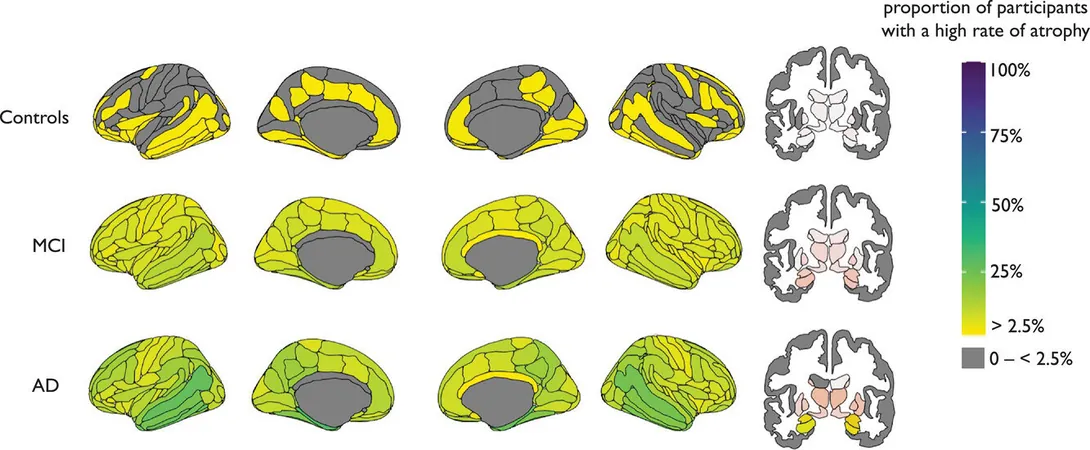
Groundbreaking Study Reveals the Unpredictable Nature of Brain Shrinkage in Alzheimer's Patients
2024-10-04
Overview of the Study
A newly released study by researchers at University College London (UCL) and Radboud University in the Netherlands has unveiled startling insights into the way brains shrink in individuals developing Alzheimer’s disease. Contrary to expectations, the research, published in the prestigious journal Alzheimer's & Dementia, found that there is no universal pattern of brain shrinkage among those afflicted with the disease.
Methodology
This landmark study is the first to meticulously examine individual patterns of brain shrinkage over time, contrasting individuals with mild cognitive impairment and Alzheimer’s with a healthy control group. By analyzing MRI scans, researchers identified specific brain regions that exhibited what they termed “outlier” shrinkage—areas that decreased in size more than what would typically be expected based on factors like age and sex.
Key Findings
Among participants with mild memory issues, those showing rapid outlier changes were significantly more likely to progress to Alzheimer's. Alarmingly, these findings suggest that individuals experiencing greater variability in brain region shrinkage might be on a more expedited path toward cognitive decline.
Variability in Brain Shrinkage
Interestingly, despite the presence of some overlap in brain regions affected, the study highlights that individuals could experience vastly different patterns of shrinkage. Professor Jonathan Schott, a lead author of the study, emphasized the importance of recognizing this variability, stating, 'Understanding and quantifying this variability has important implications for the design and interpretation of clinical trials, as well as for patient counseling and developing personalized treatment strategies.'
Impact of Alzheimer's Disease
Alzheimer's disease remains the leading cause of dementia, impacting 60–80% of the approximately 944,000 individuals diagnosed with dementia in the UK. Historical research has primarily focused on group-level differences in brain shrinkage between healthy individuals and Alzheimer’s patients. However, this approach often overlooks the nuances of individual experiences. The current study challenges this one-size-fits-all perspective by prioritizing individual assessments.
Data Utilization
Utilizing data from the Alzheimer’s Disease Neuroimaging Initiative (ADNI), researchers scrutinized MRI data from 3,233 scans of 1,181 diagnosed individuals and compared them against a baseline derived from 58,836 healthy participants. This comparative study was done over time, typically using scans taken annually. By employing advanced imaging tools, they could evaluate the structural changes in the brain across 168 distinct regions.
Progression of Outlier Regions
Findings revealed that while patients with Alzheimer’s started with 15 to 20 outlier regions, this number could double within three years. In contrast, those with mild memory impairments exhibited a slower progression, gaining 2 to 3 additional outlier regions over the same period. Notably, correlational data showed that a higher count of outlier regions related to poorer memory performance.
Future Implications
The implications of this research are profound; understanding the specific brain changes that signal disease progression could eventually lead to more tailored care for Alzheimer's patients. However, researchers acknowledge that further investigations are necessary to link specific brain changes to future cognitive symptoms.
Expert Insights
Professor James Cole, another senior author, stated, 'This study allows us to map unique 'fingerprints' of a patient’s brain health, helping us understand the individual changes occurring over time. While predicting disease progression is still a challenge, this method could be a major step toward personalized diagnosis and treatment.'
Aging and Cognitive Decline
The study also notes that as aging generally brings some cognitive decline, there is a significant overlap in areas of brain shrinkage between healthy individuals and those grappling with Alzheimer’s or mild memory dysfunction. Regions such as the hippocampus and amygdala play a crucial role in memory and emotional regulation, thus illustrating the complex nature of cognitive health as we age.
Conclusion and Call for Evolved Perspectives
Dr. Serena Verdi, the first author of the study, advocated for an evolved perspective—emphasizing the mosaic of individual differences over a rigid focus on specific brain areas, stating, 'The big picture and the individual variability contained within it are what truly matters.' This remarkable research hints at a future where personalized medical approaches can be tailored, offering hope for Alzheimer’s patients and redefining treatment pathways in the battle against cognitive decline.


 Brasil (PT)
Brasil (PT)
 Canada (EN)
Canada (EN)
 Chile (ES)
Chile (ES)
 España (ES)
España (ES)
 France (FR)
France (FR)
 Hong Kong (EN)
Hong Kong (EN)
 Italia (IT)
Italia (IT)
 日本 (JA)
日本 (JA)
 Magyarország (HU)
Magyarország (HU)
 Norge (NO)
Norge (NO)
 Polska (PL)
Polska (PL)
 Schweiz (DE)
Schweiz (DE)
 Singapore (EN)
Singapore (EN)
 Sverige (SV)
Sverige (SV)
 Suomi (FI)
Suomi (FI)
 Türkiye (TR)
Türkiye (TR)